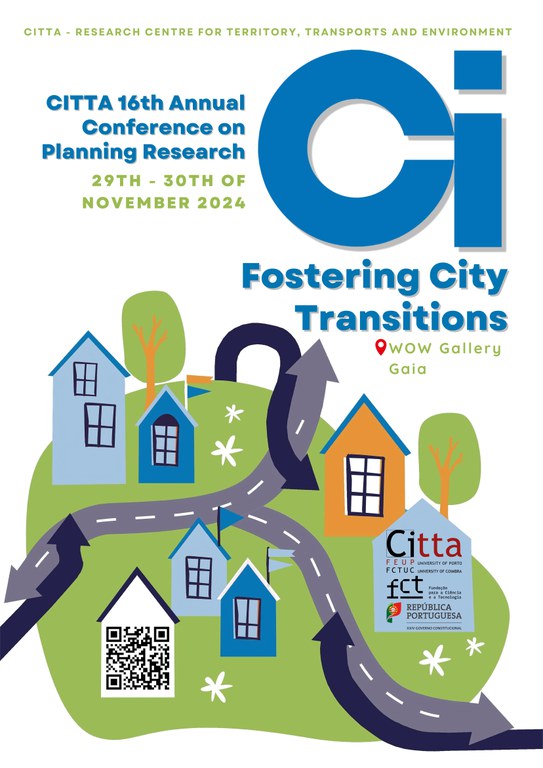16.ª Conferência Anual de Investigação em Planeamento - CITTA 2024
Promover as Transições Urbanas
29 Novembro 2024
Bem-vindo ou bem-vinda à Conferência de Investigação em Planeamento CITTA 2024, dedicada este ano ao tema "Promover as Transições Urbanas". Este evento oferece uma plataforma essencial para investigadores, profissionais e decisores políticos de várias áreas, permitindo debates críticos sobre o futuro das áreas urbanas em tempos de crise.
A conferência terá lugar no centro histórico de Vila Nova de Gaia, perto das famosas Caves do Vinho do Porto, num local com vistas deslumbrantes sobre a cidade do Porto. Este local notável oferece aos participantes uma oportunidade única de explorar uma área célebre pelo seu património e beleza, enriquecendo a experiência geral da conferência.
Organizada e promovida pelo CITTA – Centro de Investigação do Território, Transportes e Ambiente da Universidade do Porto, a conferência procura promover o progresso nas áreas do planeamento urbano e de transportes, governança e engenharia. Por meio de mesas-redondas, especialistas discutirão estratégias aplicáveis para orientar as transições urbanas em direção à sustentabilidade, à justiça e à prosperidade econômica. Essa interação permitirá aos participantes a absorção de informação prática, a troca de experiências e a oportunidade de fazer contatos. A exposição de painéis proporcionará visões diferentes sobre o tema da conferência.
 Anunciamos com entusiasmo que a conferência resulta de uma colaboração entre o CITTA e a GAIURB, reforçando o compromisso conjunto com a promoção de transições urbanas sustentáveis. Esta parceria reflete a importância de unir conhecimento académico e ação municipal para enfrentar os desafios das cidades e construir um futuro mais resiliente e inclusivo.
Anunciamos com entusiasmo que a conferência resulta de uma colaboração entre o CITTA e a GAIURB, reforçando o compromisso conjunto com a promoção de transições urbanas sustentáveis. Esta parceria reflete a importância de unir conhecimento académico e ação municipal para enfrentar os desafios das cidades e construir um futuro mais resiliente e inclusivo.
Além das sessões de abertura e encerramento, a conferência está estruturada em quatro momentos principais:
Palestra de abertura – Ali Madanipour (em inglês)
Moderação: Paulo Pinho
O orador principal convidado para o evento é o professor catedrático Ali Madanipour (Universidade de Newcastle) que conduzirá uma apresentação sobre abordagens alternativas, inovadoras e compreensivas na promoção de transições urbanas.
Sessão 1 - Promover Transições Urbanas para Ambientes Sustentáveis e Resilientes ao Clima (em português)
Moderação: Sofia Valente e Franklin Gaspar
Esta sessão explora como podemos promover a transição urbana rumo a uma maior resiliência climática e sustentabilidade ambiental, com especial enfoque nas soluções e estratégias existentes e possíveis para alcançarmos esses objectivos e para lidarmos com riscos emergentes ou crescentes associados às alterações climáticas. Serão discutidas estratégias inovadoras, políticas públicas eficazes, e colaborações intersetoriais que possibilitem essa transição. Neste sentido, o debate centrar-se-á no papel de diferentes tipos de soluções, nomeadamente Soluções Baseadas na Natureza (NBS), infraestruturas verdes e / ou azuis, na gestão de riscos associados ao clima e de crises climáticas. A sessão procurará promover um diálogo entre representantes das esferas académica e profissional, discutindo os seus principais desafios e conquistas na construção de ambientes urbanos mais resilientes ao clima e ambientalmente sustentáveis.
Sessão 2 - Promover Transições Urbanas com Transportes Integrados (em português)
Moderação: Sérgio Pedro Duarte
Os transportes têm o papel de garantir a mobilidade de pessoas e bens, devendo assegurar a inclusão de todos os cidadãos de forma sustentável e eficaz. Cercado de objetivos contraditórios, o desenho e gestão de redes de transporte, reveste-se de uma importância fulcral para a qualidade de vida nas cidades modernas. Num mundo cada vez mais digital, conseguirão os sistemas transportes integrados promover uma transição urbana que acompanhe as transições sociodemográficas atuais?
Sessão 3 - Promover Transições Urbanas para a Governança Transformativa e a Justiça Socio-espacial (em português)
Moderação: Isabel Breda-Vázquez
A sessão destaca a importância da justiça socio-espacial para a sociedade e para as nossas cidades, com um foco particular no acesso à habitação e a uma vivência urbana compatível com o cumprimentos desse direito e com as legítimas expectativas dos cidadãos a esse nível. Explora as dinâmicas emergentes, causas e consequências, desafios e estratégias (presentes e futuras) para que o planeamento intervenha com sucesso nos processos de segregação urbana e consiga promover uma governança transformadora, em que boas práticas e soluções sejam equacionadas e debatidas.
Esta conferência é precedida de um outro evento: o Simpósio Prático para Alunos de Doutoramento, organizado por uma equipa de estudantes de doutoramento do CITTA e destinado a estudantes de doutoramento em planeamento ou temas associados em qualquer universidade nacional ou estrangeira. Todas as atividades do simpósio serão realizadas em inglês.
Aguardamos com entusiasmo a oportunidade de recebê-lo(a)!
Organização
António Ferreira (Chair), Cecília Silva (Co-chair), João Bigotte (Co-chair), Sílvia Spolaor (Co-chair), Sérgio Duarte (Co-chair), António Lobo, Franklin Gaspar, Joana Bailão, Jorge Afonso, Lara Bomfim, Luísa Batista, Paulo Conceição, Sofia Valente, Vinicius Netto

